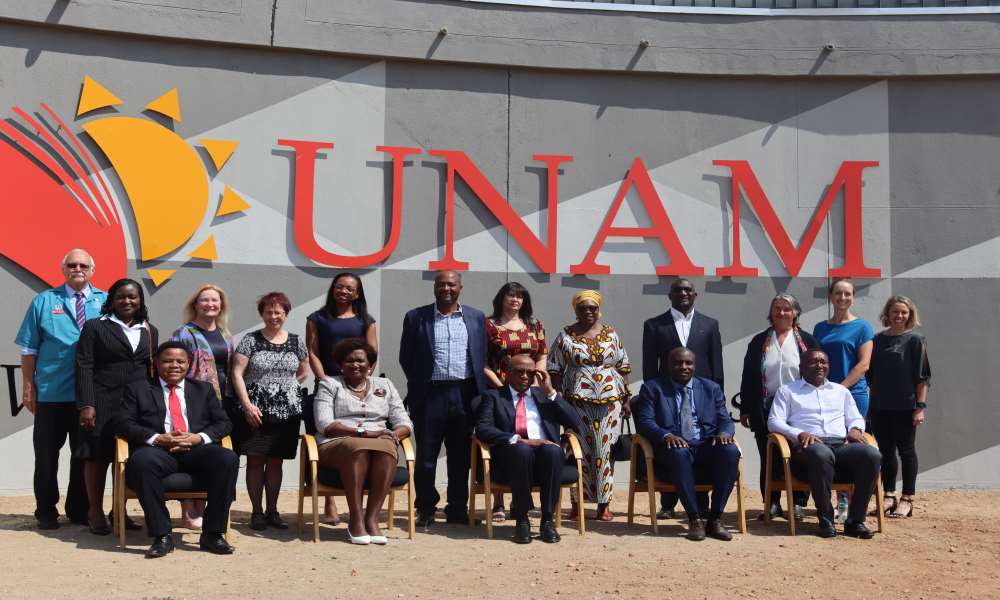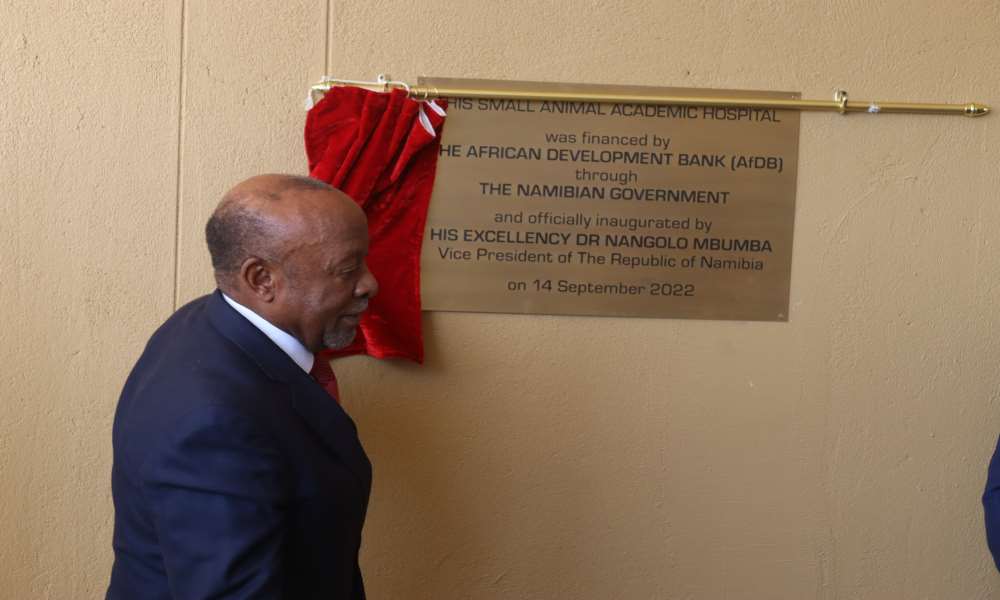Inauguration of UNAM’s small animal academic hospital
The University of Namibia (Unam) has inaugurated the outpatient unit at the Veterinary Academic Hospital located at the university’s main campus.
Junior Kapofi
The newly constructed outpatient unit of the Unam School of Veterinary Medicine’s Veterinary Academic Hospital was officially inaugurated by Namibian vice-president Nangolo Mbumba, in his capacity as Unam chancellor.
The outpatients unit, which was constructed in 2020 with funding from the African Development Bank, will significantly improve the public’s access to veterinary services. The outpatients unit boasts modern veterinary science technology that is distributed across six consultation rooms and a fully equipped laboratory.
The veterinary hospital, currently in Phase 1, will offer consultations and treatment on an outpatient basis for companion animals such as dogs, cats, and birds, among others, until the second phase of the hospital is completed.
Speaking at the event, Mbumba said the restructuring exercise currently being undertaken by Unam “shows that the institution has embraced one health by integrating the school of veterinary medicine into the faculty of health science, which traditionally housed disciplines related only to human health.”
He underlined that “the integration has brought both human and animal health under one umbrella to realise the concept of one health.”
Animal welfare
Mbumba said Namibia’s agricultural sector contributes significantly to Namibia’s GDP, with a considerable portion derived from livestock and wildlife.
“To effectively promote animal welfare, manage diseases, and maintain animal health, among others, requires a well-trained cohort of veterinarians,” he added.
All patients requiring hospitalisation or surgery will be transferred to the registered facilities at Neudamm campus until all phases of the Windhoek-based facility have been completed.
Facilities for veterinary treatment of all large animals, including cattle, horses, sheep, goats and wildlife, are also available on the Neudamm campus.
The hospital was established with the primary intention of providing student training and also to make quality veterinary care accessible to the general public.
Training
The academic aspect of the hospital is to provide final-year students with adequate practical training to build their caseload before they graduate.
This is in line with the provisions of the Namibian Veterinary Council – final year students are required to have completed a specified number of hours doing clinical work before graduation.
Final-year veterinary students will assess and treat animals under the direct supervision of a registered clinician.
They will also be taught to conduct laboratory diagnostic work to discover the animal’s diagnosis, with the guidance of a lecturer. The veterinary academic hospital is registered with the Namibian Veterinary Council and will be accessible to the public all year.
Consulting hours will be from Monday to Friday from 9:00-12:00, and on Saturdays from 9:00-11:00.The veterinary academic hospital is the first veterinary training hospital in Namibia and is part of a small group of academic hospitals in Southern Africa.
The newly constructed outpatient unit of the Unam School of Veterinary Medicine’s Veterinary Academic Hospital was officially inaugurated by Namibian vice-president Nangolo Mbumba, in his capacity as Unam chancellor.
The outpatients unit, which was constructed in 2020 with funding from the African Development Bank, will significantly improve the public’s access to veterinary services. The outpatients unit boasts modern veterinary science technology that is distributed across six consultation rooms and a fully equipped laboratory.
The veterinary hospital, currently in Phase 1, will offer consultations and treatment on an outpatient basis for companion animals such as dogs, cats, and birds, among others, until the second phase of the hospital is completed.
Speaking at the event, Mbumba said the restructuring exercise currently being undertaken by Unam “shows that the institution has embraced one health by integrating the school of veterinary medicine into the faculty of health science, which traditionally housed disciplines related only to human health.”
He underlined that “the integration has brought both human and animal health under one umbrella to realise the concept of one health.”
Animal welfare
Mbumba said Namibia’s agricultural sector contributes significantly to Namibia’s GDP, with a considerable portion derived from livestock and wildlife.
“To effectively promote animal welfare, manage diseases, and maintain animal health, among others, requires a well-trained cohort of veterinarians,” he added.
All patients requiring hospitalisation or surgery will be transferred to the registered facilities at Neudamm campus until all phases of the Windhoek-based facility have been completed.
Facilities for veterinary treatment of all large animals, including cattle, horses, sheep, goats and wildlife, are also available on the Neudamm campus.
The hospital was established with the primary intention of providing student training and also to make quality veterinary care accessible to the general public.
Training
The academic aspect of the hospital is to provide final-year students with adequate practical training to build their caseload before they graduate.
This is in line with the provisions of the Namibian Veterinary Council – final year students are required to have completed a specified number of hours doing clinical work before graduation.
Final-year veterinary students will assess and treat animals under the direct supervision of a registered clinician.
They will also be taught to conduct laboratory diagnostic work to discover the animal’s diagnosis, with the guidance of a lecturer. The veterinary academic hospital is registered with the Namibian Veterinary Council and will be accessible to the public all year.
Consulting hours will be from Monday to Friday from 9:00-12:00, and on Saturdays from 9:00-11:00.The veterinary academic hospital is the first veterinary training hospital in Namibia and is part of a small group of academic hospitals in Southern Africa.






Kommentar
Allgemeine Zeitung
Zu diesem Artikel wurden keine Kommentare hinterlassen